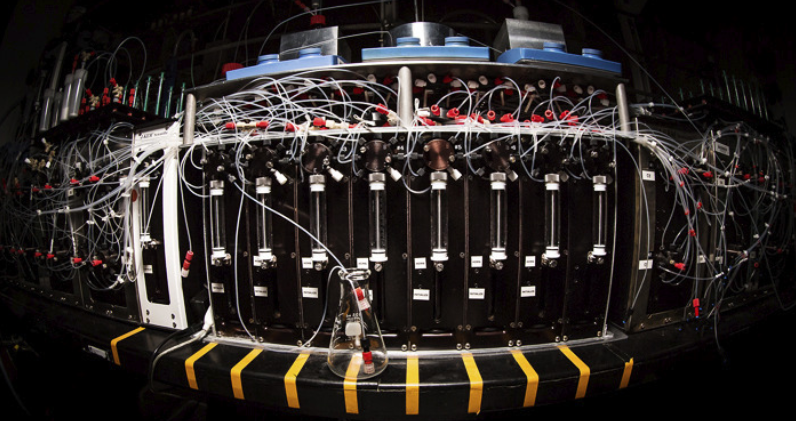If you’re anything like me, your initial excitement about 3D printing probably faded into an odd sort of amusement. But sometimes there’s something that’s exciting enough to make me take notice–like a machine that can print molecules. As covered on 3Dprint.com, a group of chemists led by a medical doctor at the University of Illinois have developed a 3D printer capable of synthesizing chemicals.
Let’s backtrack a bit to understand what the actual achievement is here. The doctor I mentioned, Martin D. Burke, heads up Burke Laboratories where he is described as studying and synthesizing “small molecules with protein-like structures.” Small molecules are, of course, organic compounds with a molecular weight of less than 900 daltons.

1 Dalton
In a video (included below), Burke describes these smalls molecules as being very important. “In fact,” he says “most of the medicines we take right now are small molecules. They’re also used as tools to understand biology, and in important technologies like LEDs and solar cells. The problem is that they’re small and they’re really hard to make.”
Where before it took a highly trained specialist a long time to make these important molecules, Burke and his team have discovered a faster process to create them, and then automated the process with their new machine. The machine works by breaking complex molecules down into their constituent parts. It then builds them back up using a method that connects one part at a time, while releasing the byproducts of the resulting chemical reactions. The machine can use over 200 different “building blocks” and an array of other molecules to create “billions of different organic compounds.” Burke claims it can synthesize chemicals “never before created by human beings.”
“The vision for the future,” Burke explains, “is that anyone who needs a specific small molecule can essentially print it out from their computer.”
The description makes the machine’s use pretty clear: printing drugs. And this would explain why Burke has cofounded a new company, REVOLUTION Medicines, Inc. to create machines for printing drugs, including an anti-fungal drug known as Amphotericin B. The machines, once scaled, could also make drug discovery easier much in the same way that releasing new hardware technologies to developers spurs on developments of creative solutions.
As Burke explains, “A 3D printer for molecules could allow us to harness all the creativity, innovation, and outside-the-box thinking that comes when non-experts start to use technology that used to only be in the hands of a select few.”
Using the manufacturing of drugs to mature and refine the technology will also help bring the technology to the industrial sector, Burke says. Want to print an LED TV from your computer? Maybe some glue? The opportunity might not be too far in the future.
Of course, this would bring up a whole slew of new copyright and intellectual property problems. Will you rip off 3M’s masking tape the same way you do mp3s? And then there is the specter of regulation. If it is taking us this long to approve UAVs, is it going to take us longer to approve chemical 3D printing?
Regardless, this appears to be quite a technological breakthrough, and a step toward a future in which we laugh at how people used to think 3D printers were only good for bobble heads.






